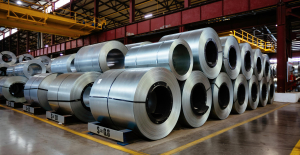No other research instrument is as popular around the world as the Hubble Space Telescope. For many years it has provided spectacular images of planets, stars and distant galaxies. "Hubble", which was named after the American astronomer Edwin Hubble, has made the universe tangible and aroused the interest in astronomy in many people. You could also say it revolutionized astronomy.
"Hubble" has now been in use for more than three decades. The telescope, which works in the visible wavelength range, was put into orbit in 1990 with the "Discovery" shuttle. Since then it has sent more than 1.5 million recordings to Earth.
The photos taken by "Hubble" are not only of great aesthetic appeal, they also provide the astrophysicists with relevant new insights. So far, scientists have reported on discoveries made by Hubble in more than 19,000 peer-reviewed articles.
The big advantage of "Hubble" compared to terrestrial telescopes is that it does not have to look through the earth's atmosphere into the depths of space. Neither rain clouds, dust particles nor air turbulence impair "Hubble's" crystal-clear view.
Hubble's capabilities have actually increased over time. During maintenance missions, defective parts were replaced or parts that were still working were replaced with better ones. Hubble was last serviced in 2009. Since then everything has been running smoothly and it is not at all foreseeable how long the telescope will continue to provide images.
However, "Hubble" does not have its own engine. And that means the space telescope will eventually burn up in Earth's atmosphere. Even at an altitude of 530 kilometers above the earth, there are still molecules in the earth's atmosphere that cause a little friction.
As a result, "Hubble" loses energy and enters lower orbits. The deeper the orbit, the more air particles there are and the greater the friction. So the process of descent becomes faster and faster over time. If "Hubble" is not lifted back into a higher orbit with outside help in the meantime, the telescope is likely to burn up in the earth's atmosphere in an estimated 20 years.
The question now is: Can and do we want to prevent this end? Should "Hubble" be kept operational for decades to come? In any case, the American space agency Nasa has called on space companies to make suggestions on how the famous space telescope could be saved.
It would be conceivable, for example, that a SpaceX Crew Dragon capsule could fly to "Hubble" and lift the research instrument to a higher orbit. If one were to decide on such a project, it would also have the sentimental aspect of not letting the pioneer of space telescopes burn up. After more than three decades of scientific and technical progress, it might make more sense to build a "Hubble II" with the latest measurement technology.
One of the highlights of the "Hubble" observations is the collision of an asteroid with the giant planet Jupiter. This crash could be followed live thanks to "Hubble". Without "Hubble" it would not have been possible to track the orbit of the mysterious object Ouamuamua. This interstellar asteroid paid a brief visit to our planetary system in 2017.
Hubble has discovered moons orbiting the dwarf planet Pluto and observed star births in cosmic clouds. Last but not least, "Hubble" has discovered numerous exoplanets, i.e. planets that do not orbit our sun, but a distant star.
However, the James Webb space telescope, which went into operation this year, is much better suited for exploring the atmospheres of these exoplanets. In contrast to "Hubble", it can also carry out measurements in the infrared wavelength range.
"Aha! Ten minutes of everyday knowledge" is WELT's knowledge podcast. Every Tuesday and Thursday we answer everyday questions from the field of science. Subscribe to the podcast on Spotify, Apple Podcasts, Deezer, Amazon Music, among others, or directly via RSS feed.

 Sudan ravaged by a year of war
Sudan ravaged by a year of war Ten years after the kidnapping of the Chibok girls, what has become of the terrorist group Boko Haram?
Ten years after the kidnapping of the Chibok girls, what has become of the terrorist group Boko Haram? The Israeli government divided on the extent of its response after Iran's direct attack on its territory
The Israeli government divided on the extent of its response after Iran's direct attack on its territory “Is it time for a killing blow?” : the Israeli press wonders about a response after the Iranian attack
“Is it time for a killing blow?” : the Israeli press wonders about a response after the Iranian attack Covid-19: everything you need to know about the new vaccination campaign which is starting
Covid-19: everything you need to know about the new vaccination campaign which is starting The best laptops of the moment boast artificial intelligence
The best laptops of the moment boast artificial intelligence Amazon invests 700 million in robotizing its warehouses in Europe
Amazon invests 700 million in robotizing its warehouses in Europe Inflation rises to 3.2% in March due to gasoline and electricity bills
Inflation rises to 3.2% in March due to gasoline and electricity bills Large French companies are alarmed by the stalling of the European economy
Large French companies are alarmed by the stalling of the European economy New sanctions against Russia send industrial metal prices soaring
New sanctions against Russia send industrial metal prices soaring Olympic Games 2024: civil servants authorized to carry out private security activities
Olympic Games 2024: civil servants authorized to carry out private security activities Threat of strikes for the 2024 Olympics: Macron says he has “confidence” in the “spirit of responsibility” of the unions
Threat of strikes for the 2024 Olympics: Macron says he has “confidence” in the “spirit of responsibility” of the unions Musical show: “Come Bach”, fantasies around the composer
Musical show: “Come Bach”, fantasies around the composer The cry of alarm from Senghor's friends has been heard
The cry of alarm from Senghor's friends has been heard World Chess Championship: Nepomniachtchi and Gukesh lead the candidates tournament
World Chess Championship: Nepomniachtchi and Gukesh lead the candidates tournament Rapper Heuss L’Enfoiré calls on Ronaldinho for his new music video
Rapper Heuss L’Enfoiré calls on Ronaldinho for his new music video Skoda Kodiaq 2024: a 'beast' plug-in hybrid SUV
Skoda Kodiaq 2024: a 'beast' plug-in hybrid SUV Tesla launches a new Model Y with 600 km of autonomy at a "more accessible price"
Tesla launches a new Model Y with 600 km of autonomy at a "more accessible price" The 10 best-selling cars in March 2024 in Spain: sales fall due to Easter
The 10 best-selling cars in March 2024 in Spain: sales fall due to Easter A private jet company buys more than 100 flying cars
A private jet company buys more than 100 flying cars This is how housing prices have changed in Spain in the last decade
This is how housing prices have changed in Spain in the last decade The home mortgage firm drops 10% in January and interest soars to 3.46%
The home mortgage firm drops 10% in January and interest soars to 3.46% The jewel of the Rocío de Nagüeles urbanization: a dream villa in Marbella
The jewel of the Rocío de Nagüeles urbanization: a dream villa in Marbella Rental prices grow by 7.3% in February: where does it go up and where does it go down?
Rental prices grow by 7.3% in February: where does it go up and where does it go down? Europeans: the schedule of debates to follow between now and June 9
Europeans: the schedule of debates to follow between now and June 9 Europeans: “In France, there is a left and there is a right,” assures Bellamy
Europeans: “In France, there is a left and there is a right,” assures Bellamy During the night of the economy, the right points out the budgetary flaws of the macronie
During the night of the economy, the right points out the budgetary flaws of the macronie Europeans: Glucksmann denounces “Emmanuel Macron’s failure” in the face of Bardella’s success
Europeans: Glucksmann denounces “Emmanuel Macron’s failure” in the face of Bardella’s success These French cities that will boycott the World Cup in Qatar
These French cities that will boycott the World Cup in Qatar Augusta Masters: the unchallenged reign of Scottie Scheffler
Augusta Masters: the unchallenged reign of Scottie Scheffler Tennis: Harold Mayot takes Cachin and goes to the second round in Barcelona
Tennis: Harold Mayot takes Cachin and goes to the second round in Barcelona Barça-PSG: “We will do it”, Luis Enrique shows his confidence before the return match
Barça-PSG: “We will do it”, Luis Enrique shows his confidence before the return match Hakimi on Mbappé before Barça-PSG: “I feel very good, very motivated, like the whole team”
Hakimi on Mbappé before Barça-PSG: “I feel very good, very motivated, like the whole team”


















